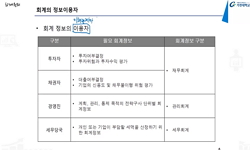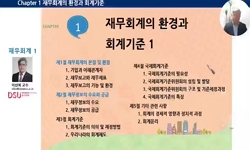This study investigates whether the differences of information asymmetry and quality of earnings exist between the firms early adopting K-IFRS and the firms not adopting K-IFRS, and between prior and post adoption in the firms early adopting K-IFRS. I...
http://chineseinput.net/에서 pinyin(병음)방식으로 중국어를 변환할 수 있습니다.
변환된 중국어를 복사하여 사용하시면 됩니다.
- 中文 을 입력하시려면 zhongwen을 입력하시고 space를누르시면됩니다.
- 北京 을 입력하시려면 beijing을 입력하시고 space를 누르시면 됩니다.

K-IFRS 조기도입이 정보비대칭과 이익의 질에 미치는 효과 = The Effects of Early Adoption of K-IFRS on Information Asymmetry and Quality of Earnings
한글로보기https://www.riss.kr/link?id=A104200487
-
저자
김용식 (한성대학교 경영학부)
- 발행기관
- 학술지명
- 권호사항
-
발행연도
2011
-
작성언어
Korean
-
주제어
한국채택국제회계기준 ; 조기도입 ; 정보비대칭 ; 이익의 질 ; K-IFRS ; early adoption ; information asymmetry ; quality of earnings
-
등재정보
KCI등재
-
자료형태
학술저널
- 발행기관 URL
-
수록면
273-299(27쪽)
-
KCI 피인용횟수
32
- 제공처
-
0
상세조회 -
0
다운로드
부가정보
다국어 초록 (Multilingual Abstract)
I document that there are no significant differences of share trading volume and share trading amount between the firms early adopting K-IFRS and the firms not adopting K-IFRS. Moreover, I find that there are no significant differences of share trading volume and share trading amount between prior and post adoption in the firms early adopting K-IFRS. The results suggest that whether the firms choose K-GAAP or K-IFRS makes no difference of information asymmetry.
Also, I document that there are no significant differences of MDA (DA by modified Jones model) and ABS_MDA (absolute DA by modified Jones model) between the firms early adopting K-IFRS and the firms not adopting K-IFRS. However, I find that there are significant differences of MDA and ABS_MDA between prior and post adoption in the firms early adopting K-IFRS and ABS_MDA significantly decreases during the post K-IFRS adoption. The results mean that the improvement in quality of earnings hinges on not whether firms choose K-GAAP or K-IFRS, but whether firms are ready to betterment the reliability of accounting information.
The results of this study imply that there are no significant differences of information level among investors and quality level of earnings between K-IFRS and K-GAAP. Nevertheless, adoption of K-IFRS offers opportunities for improving quality of earnings if the firms adopting K-IFRS have dedication to betterment the reliability of accounting information.
This study investigates whether the differences of information asymmetry and quality of earnings exist between the firms early adopting K-IFRS and the firms not adopting K-IFRS, and between prior and post adoption in the firms early adopting K-IFRS.
I document that there are no significant differences of share trading volume and share trading amount between the firms early adopting K-IFRS and the firms not adopting K-IFRS. Moreover, I find that there are no significant differences of share trading volume and share trading amount between prior and post adoption in the firms early adopting K-IFRS. The results suggest that whether the firms choose K-GAAP or K-IFRS makes no difference of information asymmetry.
Also, I document that there are no significant differences of MDA (DA by modified Jones model) and ABS_MDA (absolute DA by modified Jones model) between the firms early adopting K-IFRS and the firms not adopting K-IFRS. However, I find that there are significant differences of MDA and ABS_MDA between prior and post adoption in the firms early adopting K-IFRS and ABS_MDA significantly decreases during the post K-IFRS adoption. The results mean that the improvement in quality of earnings hinges on not whether firms choose K-GAAP or K-IFRS, but whether firms are ready to betterment the reliability of accounting information.
The results of this study imply that there are no significant differences of information level among investors and quality level of earnings between K-IFRS and K-GAAP. Nevertheless, adoption of K-IFRS offers opportunities for improving quality of earnings if the firms adopting K-IFRS have dedication to betterment the reliability of accounting information.
국문 초록 (Abstract)
분석 결과, K-IFRS 조기도입 기업과 미도입 기업 간의 정보비대칭과 이익의 질에 유의한 차이를 발견하지 못하였다. 또한 K-IFRS 조기도입 기업의 도입 이전과 이후를 비교한 결과 역시 정보비대칭에 유의한 차이를 발견하지 못하였다. 그러나 K-IFRS 조기도입 기업의 도입 이후에 이익의 질이 유의적으로 개선된다는 것을 확인하였다.
추가적인 분석을 통하여 K-IFRS 조기도입 기업과 미도입 기업 간 표본수의 비대칭 때문에 연구의 결과가 편중될 수 있다는 점을 고려하여 대응표본을 이용하여 분석한 결과는 총 표본을 사용한 결과와 동일하였다. 또한 정보비대칭 및 이익의 질의 대용치로 사용한 변수의 극단치로 인해 연구의 결과가 왜곡될 수 있다는 점을 고려하여 winsorization 방법을 사용하여 분석한 결과 역시 본 연구의 결과와 동일하였다. 마지막으로 본 연구에서 사용한 정보비대칭과 이익의 질 관련 다른 대용치를 사용하여 변수의 특성에 따라 다른 결과를 보이는지 살펴보았으며, 본 연구와 동일한 결과를 도출하였다.
본 연구의 결과는 투자자간의 정보 수준이나 이익의 질적인 수준에 있어서 K-IFRS와 K-GAAP 간에 유의적 차이가 없다는 것을 의미한다. 다만, 회계정보의 신뢰성을 높이기 위한 개별 기업의 노력에 따라 K-IFRS의 도입이 이익의 질을 개선시킬 수 있는 기회를 제공한다.
본 연구는 K-IFRS 조기도입 기업과 미도입 기업 간의 정보비대칭과 이익의 질에 차이가 있는지 여부를 살펴보았다. 또한 K-IFRS를 조기도입한 기업의 도입 이전과 이후에 정보비대칭과 이익의 ...
본 연구는 K-IFRS 조기도입 기업과 미도입 기업 간의 정보비대칭과 이익의 질에 차이가 있는지 여부를 살펴보았다. 또한 K-IFRS를 조기도입한 기업의 도입 이전과 이후에 정보비대칭과 이익의 질에 차이가 있는지 여부를 분석하여 K-IFRS의 도입에 따른 효과를 확인하였다.
분석 결과, K-IFRS 조기도입 기업과 미도입 기업 간의 정보비대칭과 이익의 질에 유의한 차이를 발견하지 못하였다. 또한 K-IFRS 조기도입 기업의 도입 이전과 이후를 비교한 결과 역시 정보비대칭에 유의한 차이를 발견하지 못하였다. 그러나 K-IFRS 조기도입 기업의 도입 이후에 이익의 질이 유의적으로 개선된다는 것을 확인하였다.
추가적인 분석을 통하여 K-IFRS 조기도입 기업과 미도입 기업 간 표본수의 비대칭 때문에 연구의 결과가 편중될 수 있다는 점을 고려하여 대응표본을 이용하여 분석한 결과는 총 표본을 사용한 결과와 동일하였다. 또한 정보비대칭 및 이익의 질의 대용치로 사용한 변수의 극단치로 인해 연구의 결과가 왜곡될 수 있다는 점을 고려하여 winsorization 방법을 사용하여 분석한 결과 역시 본 연구의 결과와 동일하였다. 마지막으로 본 연구에서 사용한 정보비대칭과 이익의 질 관련 다른 대용치를 사용하여 변수의 특성에 따라 다른 결과를 보이는지 살펴보았으며, 본 연구와 동일한 결과를 도출하였다.
본 연구의 결과는 투자자간의 정보 수준이나 이익의 질적인 수준에 있어서 K-IFRS와 K-GAAP 간에 유의적 차이가 없다는 것을 의미한다. 다만, 회계정보의 신뢰성을 높이기 위한 개별 기업의 노력에 따라 K-IFRS의 도입이 이익의 질을 개선시킬 수 있는 기회를 제공한다.
참고문헌 (Reference)
1 나종길, "회계발생액과 차별적 감사수요" 한국회계학회 28 (28): 1-32, 2003
2 장석오, "정보비대칭과 이익조정" 한국회계정보학회 25 (25): 221-245, 2007
3 안윤영, "외국인투자자와 정보비대칭 간의 관계" 한국회계학회 30 (30): 109-131, 2005
4 강선민, "국제회계기준이 재무제표에 미치는 영향: 영국과 호주기업을 대상으로" 한국회계학회 18 (18): 281-312, 2009
5 김정옥, "국제회계기준의 도입이 재무보고에 미치는 영향 : K-IFRS를 조기도입한 기업을 대상으로" 한국회계정보학회 29 (29): 345-368, 2011
6 전영순, "국제회계기준의 도입에 대한 주가반응" 한국공인회계사회 (49) : 241-282, 2009
7 여은정, "국제회계기준(IFRS)의 도입이 재무제표에 미치는 효과-IFRS 도입국(독일, 영국, 홍콩)을 중심으로" 한국국제회계학회 (19) : 175-202, 2007
8 최정호, "감사품질과 이익의 질 및 기업가치에 관한 실증적 연구" 한국공인회계사회 (48) : 109-144, 2008
9 Francis, J, "The Role of Big6 Auditors in the Credible Reporting of Accruals" 18 : 17-34, 1999
10 Becker, C, "The Effect of Audit Quality on Earnings Management" 15 : 1-24, 1998
1 나종길, "회계발생액과 차별적 감사수요" 한국회계학회 28 (28): 1-32, 2003
2 장석오, "정보비대칭과 이익조정" 한국회계정보학회 25 (25): 221-245, 2007
3 안윤영, "외국인투자자와 정보비대칭 간의 관계" 한국회계학회 30 (30): 109-131, 2005
4 강선민, "국제회계기준이 재무제표에 미치는 영향: 영국과 호주기업을 대상으로" 한국회계학회 18 (18): 281-312, 2009
5 김정옥, "국제회계기준의 도입이 재무보고에 미치는 영향 : K-IFRS를 조기도입한 기업을 대상으로" 한국회계정보학회 29 (29): 345-368, 2011
6 전영순, "국제회계기준의 도입에 대한 주가반응" 한국공인회계사회 (49) : 241-282, 2009
7 여은정, "국제회계기준(IFRS)의 도입이 재무제표에 미치는 효과-IFRS 도입국(독일, 영국, 홍콩)을 중심으로" 한국국제회계학회 (19) : 175-202, 2007
8 최정호, "감사품질과 이익의 질 및 기업가치에 관한 실증적 연구" 한국공인회계사회 (48) : 109-144, 2008
9 Francis, J, "The Role of Big6 Auditors in the Credible Reporting of Accruals" 18 : 17-34, 1999
10 Becker, C, "The Effect of Audit Quality on Earnings Management" 15 : 1-24, 1998
11 Leuz, C, "The Economic Consequences of Increased Disclosure" 38 : 91-124, 2000
12 Kothari, S, "Performance matched discretionary accrual measures" 39 : 163-197, 2005
13 Ashbaugh,H, "Non-US Firms' Accounting Standard Choices" 20 : 129-153, 2001
14 Armstrong, C, "Market Reaction to the Adoption of IFRS in Europe" Harvard Business School 2008
15 Daske, H, "Mandatory IFRS Reporting Around the World: Early Evidence on the Economic Consequences" The University of Chicago Graduate School of Business 2008
16 최성호, "K-IFRS 조기도입기업의 이익특성과 회계정보의 가치관련성" 한국회계학회 36 (36): 1-30, 2011
17 김용식, "K-IFRS 조기도입 유인과 성과 분석" 한국회계학회 19 (19): 89-115, 2010
18 Barth, M, "International Accounting Standards and Accounting Quality" 46 : 467-498, 2008
19 Beneish, M, "Information Friction and Investor Home Bias: A Perspective on the Effect of Global IFRS Adoption on the Extent of Equity Home Bias" 27 : 433-443, 2008
20 금융감독원, "IFRS 조기적용기업의 재무영향 분석(2010.4.27)"
21 금융감독원, "IFRS 도입 준비 관련 설문조사(2010.3.16)"
22 Leuz,C, "IAS versus U.S. GAAP: Information Asymmetry-based Evidence from Germany' New Market" 41 : 445-472, 2003
23 Covrig, V. M, "Home Bias, Foreign Mutual Fund Holdings, and the Voluntary Adoption of International Accounting Standards" 45 : 41-70, 2007
24 Hung, M, "Financial Statement Effects of Adopting International Accounting Standards: The Case of Germany" 12 (12): 623-657, 2007
25 Tendeloo, B. V, "Earnings Management under German GAAP versus IFRS" 14 (14): 155-180, 2005
26 Ashbaugh, H, "Domestic Accounting Standards, International Accounting Standards and the Predictability of Earnings" 39 : 417-434, 2001
27 Jeanjean, T, "Do Accounting Standards Matter? An Exploratory Analysis of Earnings Management Before and After IFRS Adoption" 27 : 480-494, 2008
28 Diamond, D, "Disclosure, Liquidity, and the Cost of Capital" 46 : 1325-1360, 1991
29 Dechow, P, "Detecting Earnings management" 70 : 193-225, 1995
30 Christensen, H. B, "Cross-section Variation in the Economic Consequences of International Accounting Harmonization: The Case of Mandatory Adoption in the UK" 42 : 341-379, 2007
31 Bartov, E, "Comparative Value Relevance among German, US, and International Accounting Standards: A German Stock Market Perspective" 20 : 95-119, 2005
동일학술지(권/호) 다른 논문
-
대학의 감가상각제도에 대한 구성원의 인식정도가 감가상각회계의 유용성 및 정보이용도에 미치는 영향
- 한국회계정보학회
- 이상도
- 2011
- KCI등재
-
- 한국회계정보학회
- 김준호
- 2011
- KCI등재
-
An Alternative Reform Preventing Audit Failures - Financial Statement Insurance -
- 한국회계정보학회
- 구치모
- 2011
- KCI등재
-
- 한국회계정보학회
- 이용석
- 2011
- KCI등재
분석정보
인용정보 인용지수 설명보기
학술지 이력
| 연월일 | 이력구분 | 이력상세 | 등재구분 |
|---|---|---|---|
| 2027 | 평가예정 | 재인증평가 신청대상 (재인증) | |
| 2021-01-01 | 평가 | 등재학술지 유지 (재인증) |  |
| 2018-01-01 | 평가 | 등재학술지 유지 (등재유지) |  |
| 2015-01-01 | 평가 | 등재학술지 유지 (등재유지) |  |
| 2011-01-01 | 평가 | 등재학술지 유지 (등재유지) |  |
| 2009-01-01 | 평가 | 등재학술지 유지 (등재유지) |  |
| 2006-01-01 | 평가 | 등재학술지 선정 (등재후보2차) |  |
| 2005-08-25 | 학회명변경 | 영문명 : Korea Accounting Information Associon -> Korea Accounting Information Association |  |
| 2005-01-01 | 평가 | 등재후보 1차 PASS (등재후보1차) |  |
| 2003-01-01 | 평가 | 등재후보학술지 선정 (신규평가) |  |
학술지 인용정보
| 기준연도 | WOS-KCI 통합IF(2년) | KCIF(2년) | KCIF(3년) |
|---|---|---|---|
| 2016 | 0.8 | 0.8 | 0.96 |
| KCIF(4년) | KCIF(5년) | 중심성지수(3년) | 즉시성지수 |
| 1.15 | 1.25 | 1.443 | 0.23 |




 KCI
KCI 스콜라
스콜라





